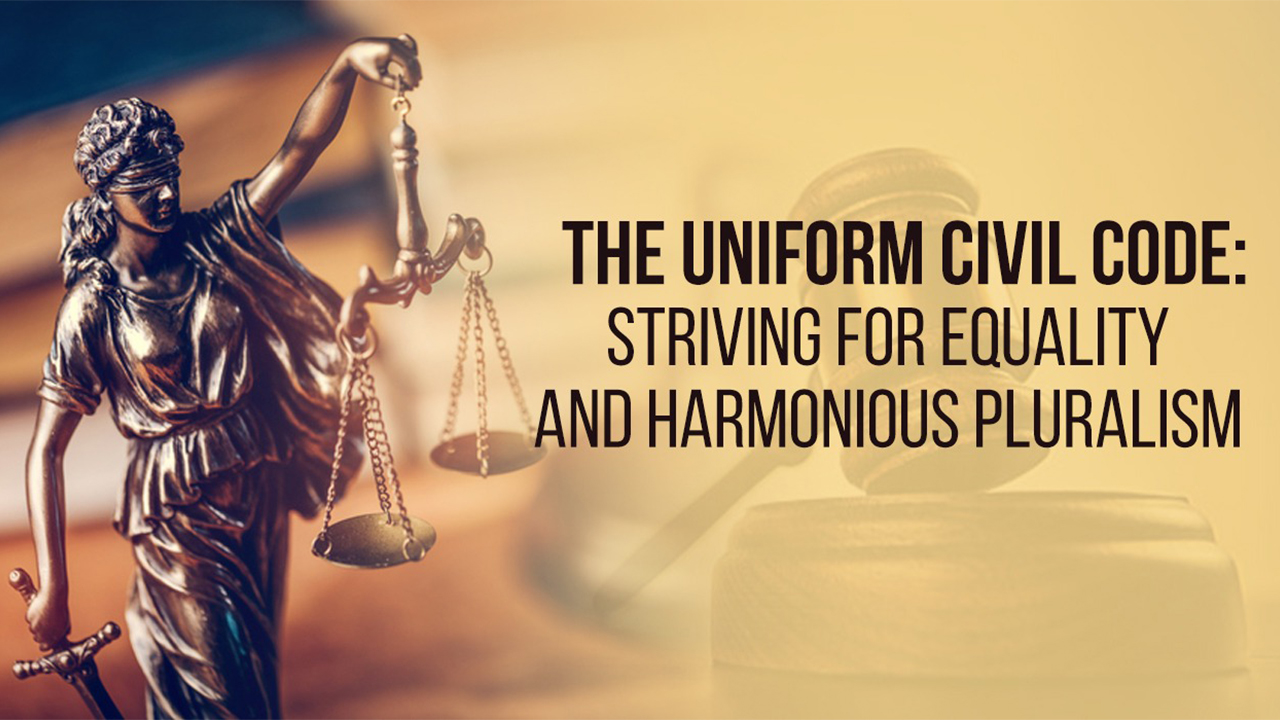Introduction:
The Uniform Civil Code (UCC) has been a subject of debate and deliberation in many countries, including India. The UCC aims to replace personal laws based on religious customs and practices with a common set of laws governing various aspects of civil life, such as marriage, divorce, inheritance, and adoption. The concept of a uniform civil code embodies the principles of equality, justice, and secularism. While it sparks diverse opinions and emotions, it remains an important topic for discussion as societies strive for harmonious coexistence and gender justice.
Understanding the Concept of a Uniform Civil Code:
The Uniform Civil Code seeks to establish a single set of laws that is equally applicable to all citizens, irrespective of their religious beliefs or backgrounds. It aims to ensure that personal laws, which are currently governed by religious texts and customs, do not perpetuate discrimination or inequality. By implementing the UCC, the intention is to create a society where individuals are governed by the same principles, rights, and responsibilities, regardless of their religious affiliation.
Promoting Equality and Justice:
One of the fundamental principles behind the UCC is the pursuit of gender equality. Personal laws rooted in religious practices often disproportionately affect women, impeding their rights and freedoms. The UCC seeks to eradicate discriminatory practices and provide equal rights to women in matters of marriage, divorce, inheritance, and property ownership. By establishing a uniform set of laws, it endeavors to ensure that women are treated as equal citizens, independent of religious practices.
Secularism and National Integration:
The UCC upholds the principle of secularism, which is essential for a diverse and multicultural society. By moving away from religious-based personal laws, the UCC aims to prevent the fragmentation of society based on religious lines. It promotes the idea that all citizens are equal before the law, fostering a sense of unity and national integration. Implementing a uniform civil code can contribute to a cohesive society where citizens are bound together by a shared legal framework.
Challenges and Concerns:
The implementation of a Uniform Civil Code is not without its challenges and concerns. Critics argue that it may infringe upon the right to religious freedom and the diversity of cultural practices. Some fear that imposing a uniform code might jeopardize minority rights and lead to social unrest. It is important to address these concerns through comprehensive dialogue, taking into account the opinions and sensitivities of all stakeholders. Striking a balance between individual rights and societal harmony is crucial in the formulation and implementation of a Uniform Civil Code.
The Way Forward:
The path to implementing a Uniform Civil Code requires a nuanced approach that respects the diversity of cultures, traditions, and religious beliefs while ensuring equality and justice for all citizens. It is essential to engage in constructive dialogue and deliberation involving legal experts, religious leaders, scholars, and various sections of society to develop a fair and inclusive code. Education and awareness programs can play a significant role in facilitating a broader understanding of the benefits of a Uniform Civil Code and dispelling misconceptions.
Conclusion:
The Uniform Civil Code represents an aspiration towards a society where personal laws are harmonized with principles of equality, justice, and secularism. While its implementation poses challenges, it also presents an opportunity to create a more equitable and unified society. By respecting diverse religious beliefs and cultural practices while ensuring fundamental rights, a well-crafted Uniform Civil Code can be a catalyst for progress, empowering individuals and promoting social cohesion in an increasingly interconnected world. It is important to recognize that the Uniform Civil Code should not be viewed as an imposition or an erasure of cultural identities, but rather as a means to guarantee equal rights and opportunities for all citizens, irrespective of their religious background.
To move forward, it is crucial to foster open and inclusive discussions that involve all stakeholders. Legal experts, religious leaders, scholars, and members of civil society should come together to deliberate on the formulation of a Uniform Civil Code that respects the diversity of traditions while upholding the principles of equality, justice, and secularism. This collaborative approach will help address concerns and ensure that the code strikes a balance between individual rights and societal harmony.
Furthermore, education and awareness programs play a vital role in facilitating a broader understanding of the benefits of a Uniform Civil Code. By promoting dialogue and disseminating accurate information, misconceptions can be dispelled, and a more informed and receptive environment can be created. This will enable individuals to actively participate in discussions and contribute to the development of a comprehensive and fair Uniform Civil Code.
Ultimately, the Uniform Civil Code is a reflection of a society's commitment to equality, justice, and secularism. While its implementation may require careful navigation of complexities and sensitivities, it presents an opportunity to strengthen the foundations of a democratic and inclusive society. By embracing the principles of equality and harmonious pluralism, societies can strive towards a future where the rights and dignity of all citizens are protected, irrespective of their religious beliefs or backgrounds.
In conclusion, the journey towards a Uniform Civil Code is a multifaceted one that requires careful consideration of diverse perspectives and interests. It is a delicate balancing act between preserving cultural identities and ensuring equal rights for all citizens. By fostering open dialogue, addressing concerns, and promoting awareness, societies can work towards a Uniform Civil Code that upholds the principles of equality, justice, and secularism, leading to a more inclusive and harmonious society

Comments